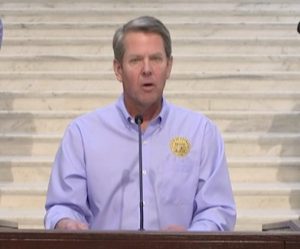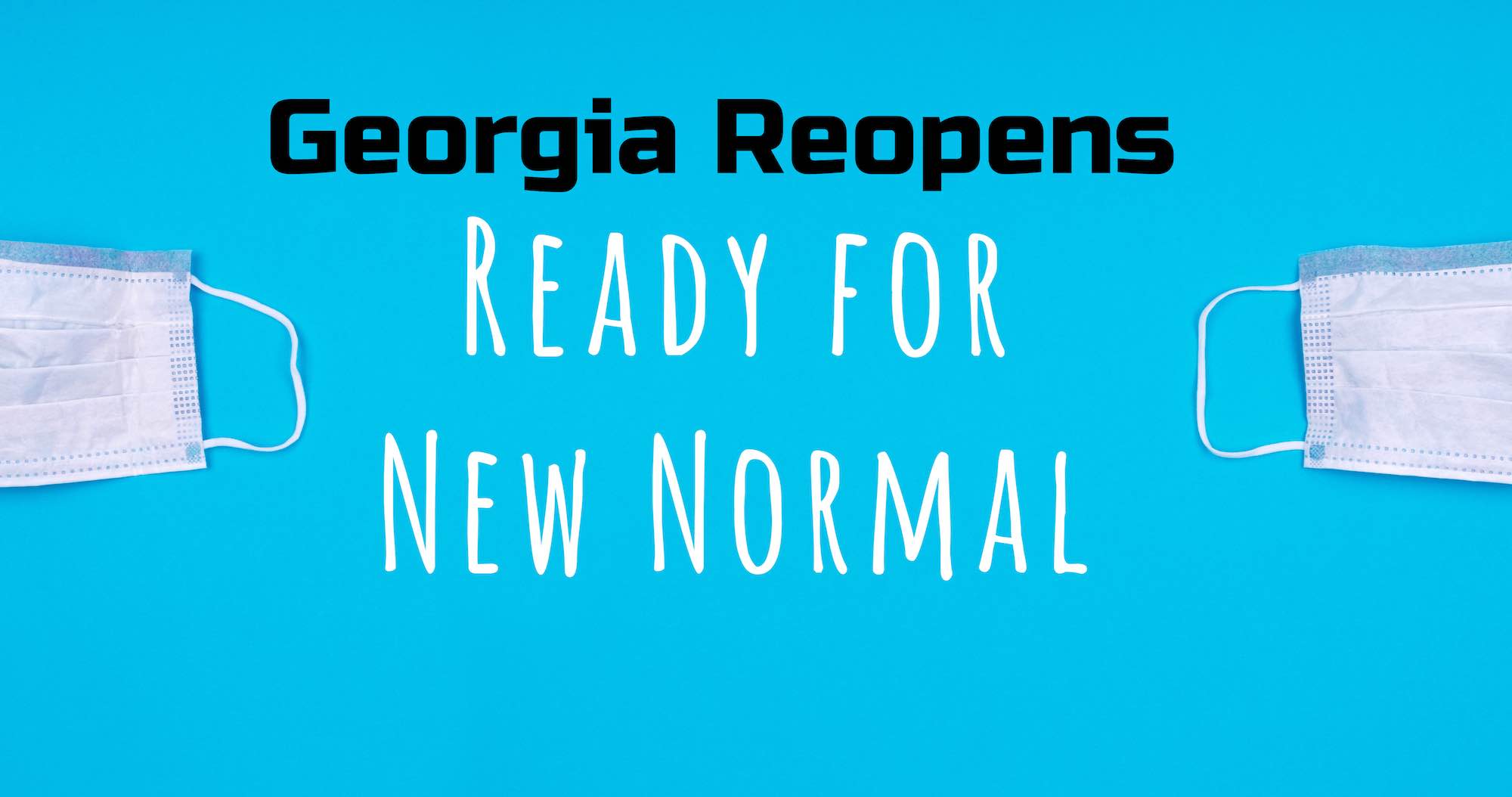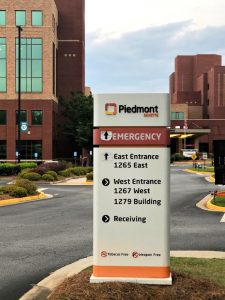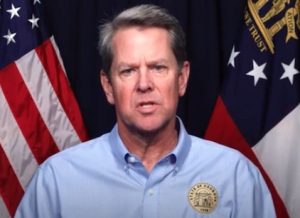
Come Monday, if you can find a bar that’s open, you can go in and have a cool one — provided no more than 24 other folks are already there.
“Starting June 1, 2020, bars and nightclubs can decide to re-open if they comply with strict sanitation and social distancing rules, all crafted to reflect industry practices and mitigate health risk,” Georgia Gov. Brian Kemp said Thursday.
But don’t forget social distancing and recommended face masks, the governor said.
The re-opening comes with lists of required criteria that the re-opening businesses and services must comply with.
Overnight summer camps get a head-start May 31, provided they meet 33 conditions. Then, June 1, Kemp is allowing most other businesses to get back to business.
Following on June 12 will be “amusement park rides, traveling carnivals, water parks, circuses, and other temporary amusement rides,” Kemp said, again with 33 mandatory requirements intended to keep patrons safe from the Covid-19 virus.
The exception to the re-openings are live performance venues, like the amphitheaters in Peachtree City and Fayetteville.
Schools can start summer classes next month if they comply with 11 criteria, Kemp said. “That includes screening workers and students for illness to prevent viral spread, enhancing campus sanitation, encouraging regular handwashing and hygiene, and keeping students separated to minimize exposure. We know how important it is for some students to be able to return to campus for in-person instruction, and these measures will accomplish that goal without compromising safety,” the governor said Thursday.
Nursing homes — which account for 48% of all Covid-19 deaths in Georgia — remain at the top of the state’s concerns about the coronavirus pandemic, particularly for more testing. “We continue to remind the public and those in the media that the more we test, the more cases we will see. That is especially true with our efforts to test high-risk populations like nursing homes,” Kemp said.
Stung by some very public mistakes with reporting pandemic data, the state Department of Health is tightening up its procedures and will move to a single daily 3 p.m. update on all the data now being released three times a day.
Seniors 65 and older and medically fragile people must still shelter in place through June 12, Kemp said.
Read the governor’s executive orders here.
Here’s the text of Kemp’s update:
“On March 14, 2020, I issued an Executive Order declaring a Public Health State of Emergency in Georgia due to the impact of COVID-19. To continue our fight against this dangerous virus and allow for enhanced emergency response efforts, I have twice used my authority to renew the State of Emergency. Today, after consultation with Lieutenant Governor Duncan and Speaker Ralston, I have decided to renew the State of Emergency for a third time through 11:59 PM on July 12, 2020. This declaration plays a critically important role in our battle against COVID-19. It allows for enhanced partnerships between the private and public sectors for our healthcare infrastructure, procurement of supplies, and coordination across all levels of government. As we continue to take measured steps forward, the Public Health State of Emergency provides flexibility for a cohesive response across government and within communities across Georgia.
“Over the past few months, we have seen frontline workers, law enforcement, teachers, business owners, elected officials, community leaders, and hardworking Georgians from every corner of our state join together in the fight against COVID-19. Now, with enhanced testing capacity and encouraging data, we are seeing a slow, careful transition to a “new normal.” Already, several state agencies have begun to phase into limited, in-person operations, and the Legislature is making plans to return to the State Capitol to resume the legislative session. Across the Peach State, businesses are reopening their doors with robust safety precautions in place, and customers are slowly – but surely – returning. This progress is encouraging as we fight to stop the spread and revive our economy. But the status quo is never acceptable. We cannot rest on our laurels. From Day One of this journey, we have used data, science, and the advice of healthcare professionals like Dr. Toomey to chart our path forward. Our next step – like the ones before – puts the health and well-being of the citizenry first.
“Today, I signed a new executive order to extend specific safety precautions, outline guidance for overnight summer camps and summer school, and outline important rules for reopening shuttered businesses. The shelter in place order for Georgians who are sixty-five and older or medically fragile will continue through June 12, 2020 with exceptions for necessary activities, including work, medical appointments, grocery shopping, home health services, and related categories. I want to thank all of those who have followed this advice and those who have helped vulnerable loved ones navigate these difficult times.
“In this executive order, we continue to strongly encourage all Georgians and visitors to wear face coverings in public to mitigate viral spread, and restrictions remain intact for nearly every Georgia business to keep employees and customers safe.
“For several weeks now, gatherings of more than ten people in a single location have been banned in Georgia unless there is at least six feet between each person. Given favorable data and relying on Dr. Toomey’s advice, we feel comfortable incrementally increasing that number to twenty-five. That means starting June 1, 2020, you can have gatherings of more than twenty-five people in a single location if you have at least six feet between each person.
“Small weddings, recreational sports, and similar events will be able to resume with a little more flexibility, but we are asking everyone to stay vigilant. Please continue to follow public health advice as you engage in these activities. Wash your hands, keep your distance, wear a mask if possible, and protect the elderly and medically fragile from exposure.
“At this time, live performance venues will remain closed. I know these closures are tough on business owners, but we will continue to watch the data to ensure the health and safety of our citizens. We are working closely with business owners, associations, and stakeholders to prepare for the future.
“Starting May 31, 2020, overnight summer camps are permitted in Georgia if they meet thirty-three specific criteria for reopening in addition to the requirements for operating a non-critical infrastructure business. Starting June 1, 2020, bars and nightclubs can decide to reopen if they comply with strict sanitation and social distancing rules, all crafted to reflect industry practices and mitigate health risk. To open their doors, bars and nightclubs must meet thirty-nine mandatory measures to ensure patron well-being. Just to name a few, those include screening workers for illness, limiting the number of people in the building to twenty-five people or thirty-five percent of total occupancy, requiring the facility to be thoroughly and regularly sanitized, only serving drinks to seated patrons or those in designated areas, limiting party size to six people, and preventing patrons from congregating. To provide clarity for banquet facilities, private event facilities, and private reception venues, we are adding them to the same category as restaurants and dine-in services so they have clear directives for operating. This change will be a big help as these facilities reschedule important events for families – especially weddings — in coming weeks.
“My executive order also specifically addresses the return of amateur and professional sports. Starting June 1, professional sports teams and organizations which engage in practices or other in-person operations must operate by the rules or guidelines of their respective sports league. In addition, all amateur sports that continue in-person operation must follow the guidelines for non-critical infrastructure organizations.
“Many school districts have reached out for guidance on holding summer school. I want to thank Superintendent Woods and his team for helping us develop appropriate safeguards for educational leaders as they plan for their students’ return. Starting next month, schools and districts can hold summer school for students if they comply with eleven mandatory criteria. That includes screening workers and students for illness to prevent viral spread, enhancing campus sanitation, encouraging regular hand-washing and hygiene, and keeping students separated to minimize exposure. We know how important it is for some students to be able to return to campus for in-person instruction, and these measures will accomplish that goal without compromising safety.
“Operators of amusement park rides, traveling carnivals, water parks, circuses, and other temporary amusement rides shall not begin operation until June 12, 2020. To open at that time, they must comply with thirty-three mandatory requirements in addition to all requirements for non-critical infrastructure businesses. We appreciate the guidance that we have received from stakeholders to develop these rules and prepare for future reopenings.
“As we have said for many weeks now, one of the most critical battlegrounds in our fight against this virus remains in our long-term care facilities, specifically in nursing homes. Over the last few weeks, the Georgia National Guard has worked closely with public health officials and the Department of Community Health to test nursing home residents and staff. Right now, forty-eight percent of all COVID-19 deaths in Georgia are connected to long-term care facilities. The earlier we test, the earlier we can intervene and try to prevent severe outcomes. As of yesterday afternoon, we have tested sixty-six percent of nursing home residents and thirty-six percent of all staff. That is in addition to nearly 2,000 infection control missions conducted with more than 900 facilities receiving two or more mission visits. This is a top priority for us as we work around the clock to protect our most vulnerable, and we will continue to do everything in our power to keep these Georgians safe. Since we began the rapid increase of our testing capacity in mid-April, we continue to remind the public and those in the media that the more we test, the more cases we will see. That is especially true with our efforts to test high-risk populations like nursing homes.
“The multiple public-private partnerships around testing that were created in a matter of weeks to fight this pandemic have exponentially increased our testing capacity, but the nature of COVID-19 testing and reporting can sometimes lead to delays and mass reporting of results. Dr. Toomey and her team at Public Health continue to work with our private-sector partners to streamline these new processes and ensure our testing data is timely and accurate. Starting next week, Public Health will move to a daily 3 PM update on the COVID-19 website. This change will give them more time to coordinate with healthcare facilities and providers to verify information and check its accuracy before publication. We remain encouraged by the numbers that we are seeing in testing, hospitalizations, and a wide variety of other data points from across the state. We are also encouraged by the new treatment being rolled out for patients in Georgia in partnership with the Trump administration. This week, the Department of Public Health will distribute over 18,000 vials of remdesivir to eighty-five hospitals across the state. This shipment will enable these facilities to treat roughly 1,670 patients. I greatly appreciate the President and the Vice President – and the rest of the administration – for their continued support with critical supplies like remdesivir as we fight this invisible enemy together.
“Speaking of the Trump administration, we had a call this week with the Vice President and the nation’s governors to discuss how states are moving safely to reopen their economies and get Americans working again. We also had a very productive call with Admiral Polowczyk and GEMA Director Homer Bryson to ensure Georgia continues to receive critical supplies as we take measured steps forward in our reopening process. And just this afternoon, we received fantastic news from the President. He will be extending full federal funding of National Guard activities through mid-August. That authorization was set to expire next month. The 3,000 men and women currently deployed in the Georgia National Guard have been absolutely vital in our fight against COVID-19. They have helped deliver millions of pounds of foods to students and Georgians in need, they have been the backbone of our testing program, and they have done lifesaving work in our nursing homes and long-term care facilities. Thanks to the President’s support, that work will continue. This is a huge help to our state’s ongoing war against the invisible enemy. As I have said many times before, the level of access and responsiveness from the President, Vice President, and the Trump administration is unprecedented and has been a huge benefit to our state as we combat COVID-19.
“Before I turn it over for questions, I wanted to mention a couple of important items. First, Georgia continues to lag behind other states in participation for the 2020 Census. The form only takes a few minutes, so please take the time to complete it. This initiative literally shapes the future of our state, so we need as many Georgians taking part as possible, and we have a long way to go. All you have to do is visit my2020Census.gov, call 1-844-330-2020, or mail back the paper form that you receive by mail.
“Many people have asked for guidance on attending in-person services at places of worship, especially in light of the President’s call to action for governors to reopen churches and religious facilities. Here in Georgia, we never closed places of worship, but we encouraged congregations to hold online or drive-in services to mitigate the risk of exposure. Now, many churches and religious institutions are beginning to reopen their doors for traditional services, and we ask Georgians to continue to heed public health advice if they decide to attend in-person. Please use social distancing, wash your hands, protect the elderly and medically fragile, and prioritize your health. Thank you again to the faith leaders who answered the call and held remote services as we battled the spread of coronavirus. Your leadership saved lives.
“Finally, we are urging all Georgians not to hold off on important medical appointments. I cannot stress this enough: do not risk a bad health outcome by postponing necessary check-ups, screenings, and procedures. Healthcare systems are having to furlough workers in the middle of a pandemic due to decreased demand for traditional services. Please get these appointments on your calendar, and help us get our healthcare providers back to work. Now, we will take questions.”











Leave a Comment
You must be logged in to post a comment.